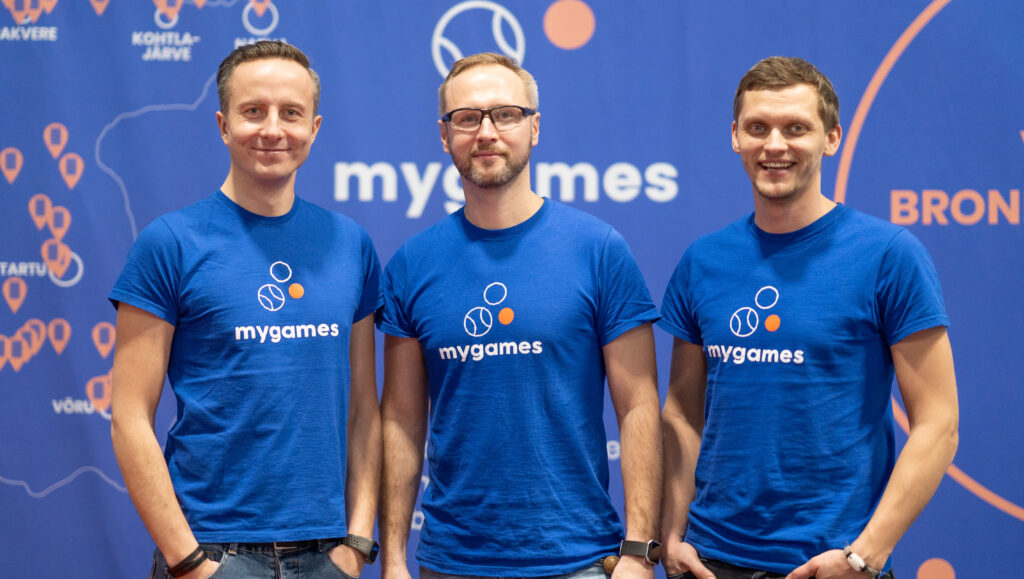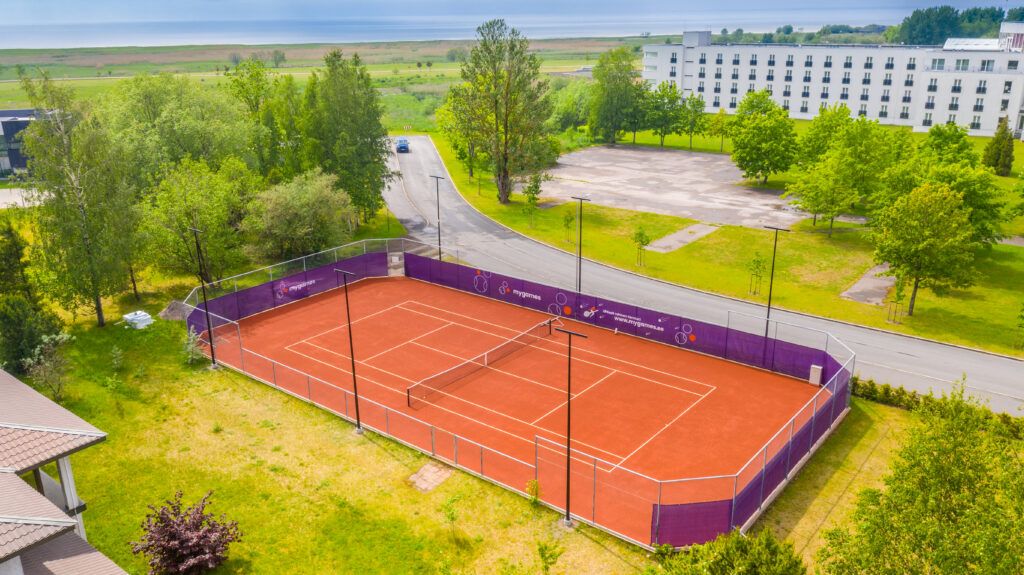28.11.2022
MyGames – the company helping sports fields to move into an app

The growth phase company MyGames helps make sports facilities self-service, and one user of their solution since the summer has been used the volleyball courts of Tehnopol. The idea almost created itself, as sports fans started to notice there were increasing bottlenecks in supply, and they started to look for solutions to this. MyGames has by now gone through the Tehnopol Startup Incubator and they are now continuing to grow strongly with support from our business services for scale-ups.
The CEO, and one of the founders of the company, Margus Randmäe explained the work and future plans of MyGames in more detail.
Where did the idea come from of working in this area?
Like a lot of other ideas, the idea of MyGames sprang to life all on its own. One of the founders of MyGames, Janno Metsa, had been playing tennis for a long time, and during that time he had started to notice several difficulties that amateur players faced. Tennis is a very popular sport, but in many ways it is quite conservative and the organisation of it still requires many operations to be done with quite clumsy online solutions or even with pen and paper. Janno started to collect those problems and possible solutions to them and write them down, and at some point he showed them to me, another sports fan. As we had already worked together on several projects and sport, technology and enterprise attracted both of us very much, we decided to start bringing innovation to the world of tennis.
We have by now expanded our focus beyond tennis to other racket sports and ball sports, and our aim now is to make sport more accessible for people. To do this we provide software and hardware that allows anybody to rent a sports field or court, making them self-service and very easy for users to find, book and use.
How has Tehnopol supported you? What are you working on with Tehnopol now?
First of all I believe that the Tehnopol Startup Incubator is absolutely the place to be for any startup company that is in its initial or early phase. We actually first encountered Tehnopol through one previous startup that Janno and I had developed together and that we took to the Startup Incubator growth programme. This was an SaaS type software solution called THS, which was designed for large companies to manage the services they buy in.
At some point with THS we grew beyond the incubator, and when we started MyGames it seemed like the right step to take to apply to the growth programme with that company, to get help from the mentors at Tehnopol in developing after the initial phase.
MyGames has now gone through both the Tehnopol Startup Incubator and the programme for growth-phase companies, and we are clients of Tehnopol business development and active partners who are always happy to cooperate. The business development services of Tehnopol have stood by our side and they give us a great range of skills, contacts, events and projects that are close at hand and very valuable for a company in its growth phase.

How much money have you raised and how have you done it?
We have funded the business from equity, loans from the owners, and early-phase investment that we received from angel investors in 2021. Together with our investors we have invested 300,000 euros in developing MyGames.
What are your plans for the near term?
Our short-term plans largely revolve around product development, and increasing market share in Estonia and neighbouring countries. We have just hired two top specialists in the second half of this year, with Marten Merila as Growth Manager and Maidu Üle as CTO. Under the leadership of Maidu we have put together and are carrying out a thorough product development plan that will lift both our software and our hardware to a new level. This will let us make our products much more user friendly, and so we will create more value for both players and court owners. One important project for the near future is certainly to automate the sports grounds of the city of Tallinn as part of the Tallinnovation competition, and to move them over to a single booking platform. We hope that together with Tehnopol and the city of Tallinn we will make a success of this pilot project and be able to roll it out in other towns in Estonia and abroad, helping manage sports fields more effectively and getting people more involved with sport.
It is often difficult to find opportunities to do sport quickly, simply and cheaply. Sports clubs can be restrictive and expensive, and favour people with high incomes. There are sports fields within the city, but their location and rules for use are often not widely known. Public sports fields are often used for other purposes, such as meeting places for BMX cyclists, while the risk of vandalism means that many sports grounds are locked, making access to them difficult. In total this all restricts the access that people have to opportunities for sport, and young people are less and less likely to simply do sport and play games in the courtyard or the street. These are the problems that we are helping to solve.
We plan to bring in strategic investors in the near future and work with them to finalise our plans for product development and to increase substantially the numbers of fields and courts, players, and bookings in our platform. Our growth manager Marten put it very well when he said that we have already seen how hotels and taxis have moved onto apps, and now it is time for sports grounds and facilities to do so too.
And finally, what would you recommend to anybody who is thinking of beginning a startup?
First of all be brave and just get going. Of course you should not just charge straight off into the unknown, but nor should you spend too long just polishing and admiring your ideas. Everything moves very quickly in the startup world, so if you have an idea then make a simple prototype, test it in the market, get instant feedback, make the necessary improvements, test it again, recalibrate your direction if necessary and so on and so on. Startups are by definition working on something that has not been done before, so it is pretty unlikely that your first idea and first prototype will hit the nail right on the head. This means there is no point in stewing on things for too long. Many startups that are in operation now have changed direction again and again, and it may be that nothing remains of their original idea.
Secondly, talk to people. Talk to possible clients, even just to all your acquaintances at first. Perhaps they can help you to solve some problem with your product or service, and if so how? Go to events in your field and talk to other startups, mentors and investors. The Estonian startup community is very mutually supportive, open and full of real success stories. Events, hackathons and other meetings are held all the time, and we have a lot of different accelerator programmes and incubators, and you can certainly get great feedback and suggestions for your ideas from them.
Thirdly, build a team around yourself. You might go faster alone, but you will go further in a team. Try to find team members who think like you do, but who have different skills. You could for example have someone who really likes dealing with people to do sales; someone who is a real fan of IT and robotics to work on technology; and someone who comes up with ideas that are so out-there that you just have to try them. Guide the synergy of a team like that in the right direction, and your startup will have a killer trump card. As I said, ideas can change and it could be that what really matters is how the team adapts to those changes, learns from them and moves on again. I can say with absolute certainty that the greatest strength and value of MyGames is and will always be our team. The executive team, interns, volunteers, partners, mentors and investors all have a role to play in our company, without which we would not be operating right now.

















